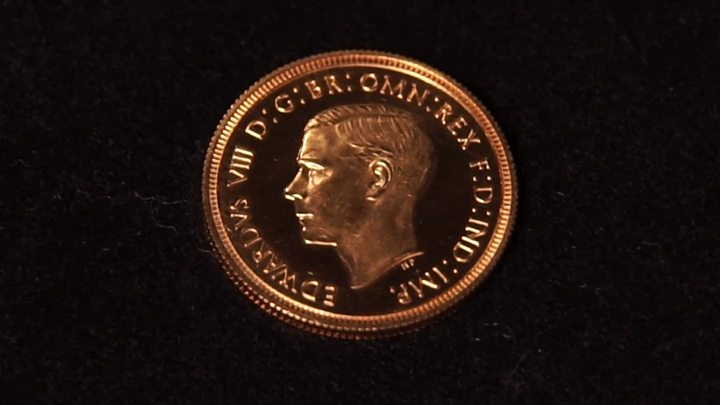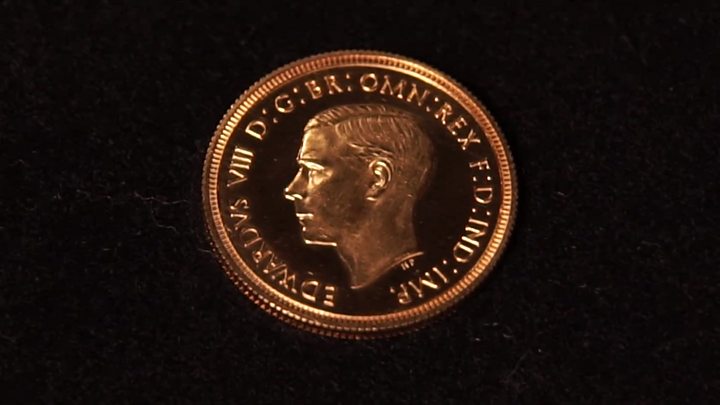Collector pays UK-record £1m for rare coin
Only six Edward VIII sovereigns were made but it is not just its rarity that fascinates historians. …


Media playback is unsupported on your device
An Edward VIII sovereign has become the first UK coin to be bought for £1m, the BBC can reveal.
The new owner, a private collector, described the chance to buy it and bring it back from the US as a “once in a lifetime opportunity”.
The coin is one of a trial set of six which never went into mass production owing to Edward’s abdication in December 1936.
It only has a face value of £1 but is now the UK’s most valuable coin.
The 22 carat gold sovereign – a type of coin which has not been struck for general circulation since 1932 – is just 22mm in diameter and weighs 7.98g making it just fractionally smaller and lighter than a pound coin.
It was prepared for striking in January 1937, but the previous month the King abdicated in order to marry American divorcee Wallis Simpson.
Only the trials remained, but they were hidden from public view for decades. Edward, who became the Duke of Windsor, requested a set of coins but was refused by his brother, George VI.
Now, four of the set are with museums and institutions, with two in private hands. The latest owner, a sovereign collector who wished to remain anonymous, said: “When the opportunity came along, I felt I could not turn it down. It was a once in a lifetime opportunity.
“I’m aware that [£1m] is a lot of money for a coin, but if I did not secure it now, I’d not get the chance again.”
Quirk of vanity
The coin was last sold for a then-record £516,000 to a US collector in 2014, revealing its status on both sides of the Atlantic.
What fascinates collectors and historians is not only its rarity, but also that Edward VIII was willing to break with a convention that went back centuries to Charles II.
This saw each monarch face the opposite direction to their predecessor. Edward preferred his left profile, partly owing to his hair parting, and insisted on the portrait facing, in effect, the wrong way.
“Edward VIII is quite a vain character. He insisted on facing the same way as his father, because he believed that was his best side,” said Chris Barker, from the Royal Mint Museum.
George VI, who succeeded him, also showed his left profile, keeping to tradition as if Edward had not broken the sequence.
How the sale happened
How do you value a coin so sought-after and so rare? The Royal Mint, the Treasury-owned business which strikes coins for nations around the world, set up a service two years ago aiming to find and authenticate coins and precious metals.
Its state-of-the-art lab, at the Mint in South Wales, contains x-ray machines and other technology that can easily spot a fake.
This collector services division acted as the go-between for the sale, for a cut of the price. Its experts found that the coin could be for sale, contacted the collector of sovereigns, and effectively acted as a broker for the deal.
Rebecca Morgan, head of the service, said: “The Royal Mint has an unbroken record of minting for 1,100 years so we’re uniquely placed to source historic, British coins for our customers.
“They can feel confident that it has been through the authentication checks and they have paid a fair price for it.”
The Mint may have helped to secure a record sale for a UK coin, ahead of a Queen Anne Vigo five guinea coin, but it is still a long way short of the world record.
The flowing hair dollar coin, the first issued by the US government, fetched more than $10m (£7.5m) at auction in 2013.



